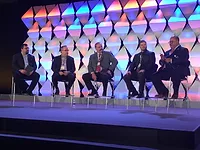U.S. Conference of Mayors's Vision for 2020 Focuses on Technology

The U.S. Conference of Mayors has released its Mayors’ Vision for America: A 2020 Call to Action, which revolves around technology to help improve critical infrastructure and protect citizens.
The U.S. Conference of Mayors is the official non-partisan organization of cities with each city represented in the Conference by its chief elected official, the mayor. The Mayors’ Vision for America: A 2020 Call to Action, drafted by The U.S. Conference of Mayors, outlines 12 strategic priorities that will improve the quality of life for all U.S. residents in 2020 and beyond.
Many of the strategies propose technology as a way to improve the quality of life. In particular, one of the strategies outlined is to "Embrace Modern Technology While Protecting Consumers and Cities."
The Mayors cite a 2018 Gallup poll, in which 72 percent of U.S. adults say they have a “great deal” or a “fair amount” of trust in their local government. "The public’s confidence in the actions of their local leaders and local governments is an important asset as many new technologies, increasingly disruptive ones, are being deployed throughout the U.S. Among the examples of this leadership, cities have been pioneers in digital government and have embraced transparency and collaboration with open data," says the document.
Cities, the mayors say, are leading the public debate about the need to secure governmental systems from the threats of domestic and international threats. According to the mayors, "in the transportation and communications sectors, cities have been leading all governments in the piloting and testing of autonomous vehicles and drones, and in building new partnerships with the telecommunications companies to expand access to broadband and wireless services."
To support this local leadership, mayors call on the President and Congress to:
- Work with all levels of government in developing data standards to improve access, interoperability, transparency, and security, and provide resources to cities to respond to intentional and deliberate cyber crime.
- Protect election systems and other technology assets in local government with financial and technical support.
- Support local efforts to provide for greater digital equality and literacy, including senior citizens.
- Support local efforts to pilot and test new technologies, especially in the transportation sector, giving communities the opportunity to evaluate and deploy these systems free from unnecessary federal preemption and/or “one-size-fits-all” federal regulatory regimes.
- Reverse actions by the Federal Communications Commission that subordinate local property rights and zoning powers to the agency’s efforts to subsidize the nation’s communications companies with local government property, actions which exceed authorities granted by Congress in previous statutes.
To read the plan, visit the U.S. Conference of Mayors website.
Looking for a reprint of this article?
From high-res PDFs to custom plaques, order your copy today!






